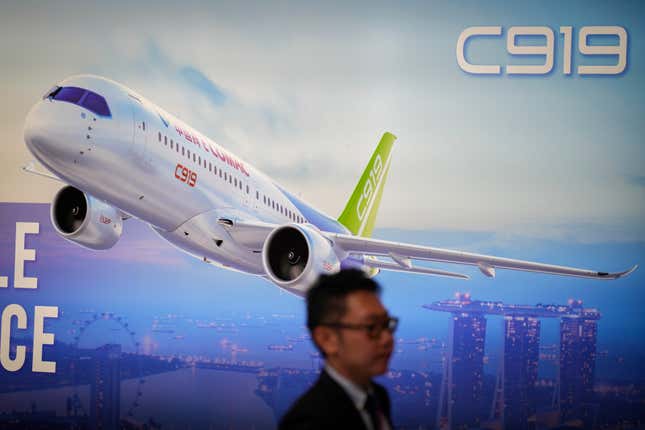
SINGAPORE (AP) — The Singapore Airshow — Asia’s largest — kicked off Tuesday with an array of aerial displays including some by China’s COMAC C919 narrow-body airliner, with aircraft manufacturers such as COMAC and Boeing announcing new orders.
It’s the first time Singapore will open the event to the public since 2020, when a scaled-down version went ahead as the COVID-19 pandemic was just starting.
The biennial show comes as Asia’s aviation sector is taking off following the hard years of the pandemic, when many countries in the region closed their borders to most international travel.
Subhas Menon, director general of the Association of Asia Pacific Airlines, said that this year's show was “back in full swing” with over 1,000 exhibitors.
“The Singapore Airshow is a good opportunity for exhibitors to show off the direction they’re going, in terms of technology like autonomous vehicles and so forth,” Menon said in an interview Tuesday.
He said passenger loads in the region are nearly back to pre-COVID levels, and that Asia Pacific is expected to account for 50% of the growth in air travel demand this year.
But even as the aviation sector bounces back, the industry faces a broader supply chain crunch, with parts and plane shortages and shortages of personnel, from air crews to pilots.
“Supply chain issues are definitely affecting the timely delivery of aircraft and spares, and that’s one of the reasons why capacity growth is lagging behind traffic growth,” Menon said.
“We do not know when this will ease as it’s related to trade tensions and geopolitical problems that are happening around the world,” he said.
On Tuesday, China’s Tibet Airlines finalized an order for 40 C919 passenger jets and 10 ARJ21 regional jets from the Commercial Aircraft Company of China (COMAC). The two companies signed the deal on the sidelines of the airshow.
COMAC's C919 is a narrow-body airliner, similar to the Airbus A320neo and Boeing's 737 Max jets. COMAC designed many of the C919’s parts but some of its key components, including its engine, are still sourced from the West.
The orders come as COMAC attempts to position itself as a viable option for single-aisle jets, as companies like Boeing and Airbus grapple with a backlog of orders.
The company has received over 1,000 orders for its C919, according to Chinese media, although the plane is currently only certified in mainland China. Four C919s are currently operational with China Eastern Airlines.
The C919’s debut at the show is the first time the jet has made a trip outside Chinese territory, though the aircraft performed a fly-past in Hong Kong in December in its first foray outside of mainland China.
Separately, Boeing and Thai Airways on Tuesday jointly announced that the airline had ordered 45 787 Dreamliners to grow its fleet as it seeks to expand its international network.
The flying display — a highlight of the biennial air show — saw Singapore's air force perform an aerial display with a F-15SG fighter jet and an AH-64D Apache helicopter. COMAC's C919 and Airbus' widebody A350-1000 aircraft also performed fly-pasts.
The Indian air force's Sarang helicopter team showed off an array of aerial acrobatics, while the Indonesian air force's Jupiter and the Australian air force's Roulettes performed acrobatic maneuvers, including crossovers and drawing giant hearts in the sky.
The South Korean air force’s Black Eagles, flying in their acrobatic aircraft T-50B, were the finale of Tuesday's aerial display, performing maneuvers including the drawing of the Taegeuk — the yin-yang circle found on the South Korean flag — via the jets' smoke system.
The U.S. Air Force’s B-52 Stratofortress is expected to make a fly-past on Thursday.
U.S. aircraft manufacturer Boeing will not be featuring any passenger jets at the show. The firm is under scrutiny after a midflight blowout of a fuselage panel on one of its 737 Max 9 jets last month.
This year’s airshow is also expected to spotlight sustainable aviation, with Airbus using a blend of sustainable aviation fuel made of feedstock from cooking oil and tallow, together with conventional jet fuel for the A350-1000 aircraft in its aerial display.
Singapore said this week it will impose a new green jet fuel levy on travelers from 2026, as flights departing from Singapore will be required to use sustainable aviation fuel that year.
Hyundai’s U.S.-based Supernal unit, which specializes in advanced mobility aircraft such as air taxis, is also an exhibitor in this year’s airshow.
The event, which runs from Feb. 20 to 25, is expected to draw more than 50,000 visitors, with the last two days open to the general public. More than 1,000 companies from over 50 countries are participating.



